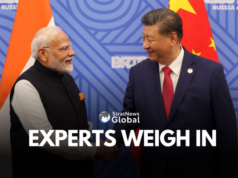Amid the diplomatic buzz of the Raisina Dialogue in New Delhi, former Mongolian Foreign Minister Lundeg Purevsuren shared a candid perspective on his country’s evolving global role with StratNews Global. A career diplomat, Purevsuren had just arrived from the Munich Security Conference, bringing fresh insights from Europe to the dynamic discussions in India.
Mongolia, often perceived as a remote nation landlocked between Russia and China, sees India as more than a strategic partner—it considers it a “spiritual neighbor.” The deep-rooted Buddhist ties between the two nations form the foundation of their relationship, but today, the partnership extends beyond cultural bonds to critical economic and defence collaborations.
One of the most significant projects between India and Mongolia is the construction of Mongolia’s first oil refinery, a crucial step toward reducing the country’s dependence on Russian oil. Funded with $1.6 billion in Indian credit, the refinery stands as a testament to Mongolia’s desire for economic diversification and self-reliance. However, challenges persist, particularly in trade logistics. With no direct access to the sea, Mongolia’s exports must pass through China or take a longer route via Russia—an issue that requires urgent diplomatic solutions and stronger global trade agreements.
Beyond infrastructure, the two countries also share a growing interest in space technology. With Mongolia’s vast, sparsely populated terrain, satellite communication and space-based solutions are becoming essential. Indian advancements in space technology could play a key role in Mongolia’s aspirations, an area of collaboration that Purevsuren sees as full of potential.
As a seasoned diplomat, he also reflected on broader geopolitical shifts, particularly in Europe. Having observed firsthand the reactions to Donald Trump’s policies, he noted that European nations were beginning to re-evaluate their security and economic strategies. Trump’s approach, though controversial, had inadvertently unified European nations, pushing them to take greater responsibility for their defence.
Through it all, Mongolia remains committed to navigating its unique geopolitical position with diplomatic finesse. Striking a balance between powerful neighbours while forging new partnerships, especially with India, remains at the heart of its foreign policy. As global politics shift, Mongolia’s strategy is clear—stay neutral, stay open, and seek new frontiers, whether in trade, technology, or even space.
Watch the full interview to get insights into a country that is keen to take its rightful place in the world.




